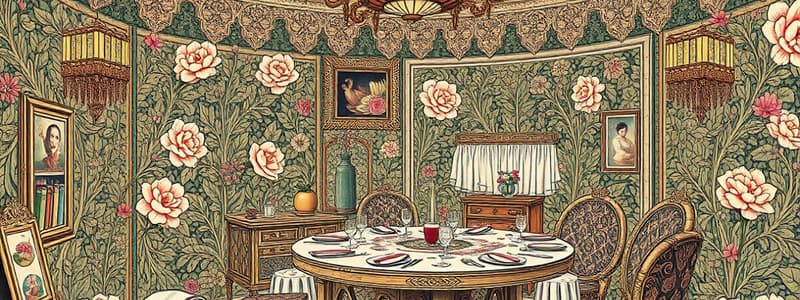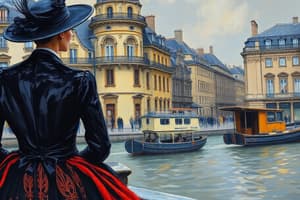Podcast
Questions and Answers
Which of the following best describes the 'Country of Origin Effect'?
Which of the following best describes the 'Country of Origin Effect'?
- Marketing power is solely determined by the price point of a product, regardless of its origin.
- Products must originate from multiple countries to gain significant marketing power.
- Associating a product with a country known for excellence in that domain enhances its marketing power. (correct)
- Products from any country gain automatic marketing power due to globalization.
Louis XIV's court culture in France hindered the development of French leadership in food and fashion industries.
Louis XIV's court culture in France hindered the development of French leadership in food and fashion industries.
False (B)
What consequence resulted from the system of discerning judgment created in consumption during the Ancien Régime?
What consequence resulted from the system of discerning judgment created in consumption during the Ancien Régime?
social exclusion
The Chambre Syndicale de la Haute Couture was founded in ______.
The Chambre Syndicale de la Haute Couture was founded in ______.
Match the following individuals with their contributions to haute cuisine:
Match the following individuals with their contributions to haute cuisine:
According to Brillat-Savarin, what does food discourse in France reflect beyond just recipes?
According to Brillat-Savarin, what does food discourse in France reflect beyond just recipes?
The Michelin Guide initially focused exclusively on showcasing Parisian cuisine.
The Michelin Guide initially focused exclusively on showcasing Parisian cuisine.
Name two elements emphasized in the French gastronomic meal as recognized by UNESCO.
Name two elements emphasized in the French gastronomic meal as recognized by UNESCO.
According to Roland Barthes, wine is a ______ object of French identity.
According to Roland Barthes, wine is a ______ object of French identity.
Match the following terms with their significance in French national identity:
Match the following terms with their significance in French national identity:
What is the literal meaning of 'haute couture'?
What is the literal meaning of 'haute couture'?
Anyone can use the term 'haute couture' freely without regulation.
Anyone can use the term 'haute couture' freely without regulation.
Name one requirement that must be met for an establishment to be considered 'haute couture.'
Name one requirement that must be met for an establishment to be considered 'haute couture.'
The term 'haute couture' became a controlled ______ in 1945.
The term 'haute couture' became a controlled ______ in 1945.
Match the key figures with their roles in fashion history:
Match the key figures with their roles in fashion history:
What was the 'Battle of Versailles (1973)'?
What was the 'Battle of Versailles (1973)'?
A 'bande dessinée' is uniquely associated with English comic traditions.
A 'bande dessinée' is uniquely associated with English comic traditions.
What is the literal translation of the French term 'bande dessinée'?
What is the literal translation of the French term 'bande dessinée'?
In comic terminology, a 'planche' refers to a ______ page.
In comic terminology, a 'planche' refers to a ______ page.
Match the following terms related to analyzing BD (bande dessinée) with their definitions:
Match the following terms related to analyzing BD (bande dessinée) with their definitions:
Flashcards
Haute couture and haute cuisine
Haute couture and haute cuisine
Symbolizes luxury, distinction, and national cultural heritage.
Country of Origin Effect
Country of Origin Effect
When a product is associated with a country known for excellence, it gains marketing power.
French court culture
French court culture
Under Louis XIV, French court culture supported competitive taste, laying groundwork for French leadership in food and fashion.
Rise of world exhibitions
Rise of world exhibitions
Signup and view all the flashcards
Marie-Antoine Carême
Marie-Antoine Carême
Signup and view all the flashcards
Auguste Escoffier
Auguste Escoffier
Signup and view all the flashcards
Michelin Guide
Michelin Guide
Signup and view all the flashcards
Haute Couture
Haute Couture
Signup and view all the flashcards
Haute Couture definition
Haute Couture definition
Signup and view all the flashcards
Rose Bertin
Rose Bertin
Signup and view all the flashcards
1945: 'haute couture'
1945: 'haute couture'
Signup and view all the flashcards
Edward Saïd
Edward Saïd
Signup and view all the flashcards
Émile Zola
Émile Zola
Signup and view all the flashcards
Négritude Movement
Négritude Movement
Signup and view all the flashcards
Bande dessinée (BD)
Bande dessinée (BD)
Signup and view all the flashcards
BD definition
BD definition
Signup and view all the flashcards
1949 Law
1949 Law
Signup and view all the flashcards
Planche
Planche
Signup and view all the flashcards
Astérix
Astérix
Signup and view all the flashcards
Gauls vs. Roman
Gauls vs. Roman
Signup and view all the flashcards
Study Notes
Food and Fashion
- Haute couture and haute cuisine are symbols of luxury, distinction, and national cultural heritage
- These are linked historically through refinement, manners, and taste performance, as well as class identity
- Country of Origin Effect enhances a product's marketing power when associated with a country known for excellence
- French origin signifies quality and refinement
- Christian Dior equated cooking and couture as craftsmanship forms that involve "the hands and the mind"
- Under Louis XIV, French court culture encouraged competitive performance of taste, setting the stage for French leadership in food and fashion
- This created a system of discerning judgment when it came to consumption
- Social exclusion, discrimination, and the French Revolution were consequences of this system
- The rise of world exhibitions served as platforms for visual and culinary displays
- Charles Frederick Worth established the first couture house in 1868
- The Chambre Syndicale de la Haute Couture was founded in 1878
- Ritz (1898) and Maxim’s (1893) made dining a spectacle, where food was a pretext to be seen and fashionable clothing was required
Haute Cuisine
- Marie-Antoine Carême (1783–1833) introduced "nouvelle cuisine," which emphasized light and artistic presentation
- Carême cooked for elites and democratized recipes in publications
- Auguste Escoffier (1846–1935) created the brigade de cuisine, a hierarchical kitchen system
- Escoffier wrote Guide culinaire (1903), which became a culinary standard for chefs
- Brillat-Savarin (1826) stated, "Tell me what you eat, and I'll tell you who you are."
- Food discourse in France is nationalized, reflecting culture, identity, and ritual
Michelin Guide & Gastronomy
- Launched in 1900 for car travelers
- Added a star system in 1926
- In 1936, 1–3 star criteria got established
- Expanded to focus from Paris to regional cuisines
- The French gastronomic meal includes an apéritif, 4+ courses (starter, meat/fish + vegetables, cheese, dessert), and digestif
- It emphasizes ritual, presentation, local ingredients, pairing, and sensation
Food as National Symbol
- Wine is considered a totemic object of French identity
- Steak and fries are emotionally charged markers of Frenchness
- De Castries’ request for fries after the Indo-China armistice symbolized reentry into the French national community
Haute Couture
- "Haute Couture" literally means “High dressmaking”
- It is a protected term regulated by the Fédération de la Haute Couture et de la Mode
- It involves handcrafted garments, high-quality materials, and made-to-measure designs
- Rose Bertin was Marie-Antoinette’s stylist
- Worth was the first fashion “designer”, not just a tailor
- Chambre Syndicale was formed in 1868
- It includes custom fitting
- It is handmade by specialists with high-quality fabrics and exclusive designs
- In 1945, the term “haute couture” became a controlled appellation
- Paris Fashion Week was initially private events, then in 1945 rules required public showings
- The first official Paris Fashion Week was in 1973
- The Battle of Versailles (1973) was a couture showdown between France vs. U.S. designers, with French designers Dior, Givenchy, and YSL and American designers Halston, de la Renta, and Klein
The Intellectual
- An intellectual is a public figure who uses speech, writing, teaching, and media to represent marginalized voices, raise difficult questions, challenge stereotypes and dominant ideologies, and maintain critical alertness
- Intellectuals must resist co-optation by power structures
- The role is defined by a concept of justice, not popularity
- "Speaking the truth to power means carefully weighing the alternatives, picking the right one, and representing it where it can do the most good."
History of the French Intellectual
- Voltaire opposed fanaticism and religious intolerance during the Calas affair
- Victor Hugo, George Sand, and Jules Michelet are other key figures
- Captain Alfred Dreyfus, a Jewish officer, was falsely convicted in 1894
- Public opinion was against him, but friends fought to prove his innocence
- Émile Zola wrote “J’accuse…,” publicly blaming the army and authorities for injustice and risking status to defend truth
- Zola stated: “My duty is to speak out… otherwise I become an accomplice.”
Existentialist Intellectuals
- Simone de Beauvoir was a philosopher, feminist, and novelist
- She wrote The Second Sex (1949), stating “One is not born, but rather becomes, woman.”
- Beauvoir advocated for gender as a social construct and co-founded Les Temps Modernes journal
- Jean-Paul Sartre was an existentialist, stating “Existence precedes essence.”
- Sartre wrote novels (Nausea), plays (No Exit), and philosophy (Being and Nothingness)
- Intellectuals developed the idea of committed literature
- Writers bear responsibility for the societal impact of their words
The Négritude Movement
- This was a literary-political movement of the 1930s–50s
- It emphasized rejection of Western materialism, celebration of African culture, assertion of Black dignity and political liberation, and blending poetic tradition with activism
- Léopold Sédar Senghor (later president of Senegal), Aimé Césaire, Léon Damas, and Paulette Nardal are key figures
- Nardal and Césaire worked through journalism, literature, and activism and used writing as tools of cultural resistance
Final Questions
- How do race and gender shape the visibility of intellectuals?
- Why are women like Paulette Nardal less remembered than men?
- How can today’s intellectuals take inspiration from past figures?
Comic Strips
- French comic strips = bande dessinée (BD)
- This is unique to Francophone tradition in France and Belgium
- Astérix, Tintin, Spirou, and Schtroumpfs are famous series
- BD is considered the “Ninth Art” alongside literature, cinema, and photography
- BD is a French-language mixture of image and text forming a narrative
History of BD
- Medieval manuscripts
- Livre d’emblèmes (16th–17th c.)
- Image d’Épinal (19th c.) are pre-history examples of BD
- Tintin debuted in 1929
- Le Journal de Mickey brought American comics to France in 1934
- The 1949 Law prevented comics from portraying immoral behavior positively to youth
- Pilote magazine was founded in 1959
- Cité Internationale de la BD was established in 1990
- Angoulême BD festival began in 1974
Analyzing BD
- Planche: Whole page
- Bande: Horizontal strip
- Case: Frame/panel
- Cadre: Border of frame
- Mise en page: Page layout
- Phylactère: Speech bubble
- Récitatif: Text outside bubbles
- Peritext: Covers, sound effects, etc.
- Uses cinematic codes such as framing, angle, composition, and montage
Astérix the Gaul
- Astérix is a French national myth via satire
- Gauls vs. Romans stand in for French resistance vs. Nazi occupation, France vs. America, and France vs. Imperialism
- Vercingétorix is a historical figure and a national hero of Gaulish resistance
- The comic strip reflects neo-patriotism and complex memory of colonialism and WWII
Studying That Suits You
Use AI to generate personalized quizzes and flashcards to suit your learning preferences.




